Note: This is part two of my exclusive interview with Luca Valdesi, world kata champion. Read part one here!
At first glance, you might think you’re standing next to Hollywood movie star Pierce Brosnan – but alas, the accent quickly gives Luca away.
(Unless Pierce Brosnan actually speaks Italian. In that case, I might just have interviewed 007!)
However, Luca Valdesi – describing himself as smart, brilliant, or perhaps even scintillating (and yes, he readily admits that he Googled that word) is not your everyday James Bond look-alike. Oh no.
Far from it.
(Although he has actually done a mini action movie, aptly named ‘Black Belt‘).
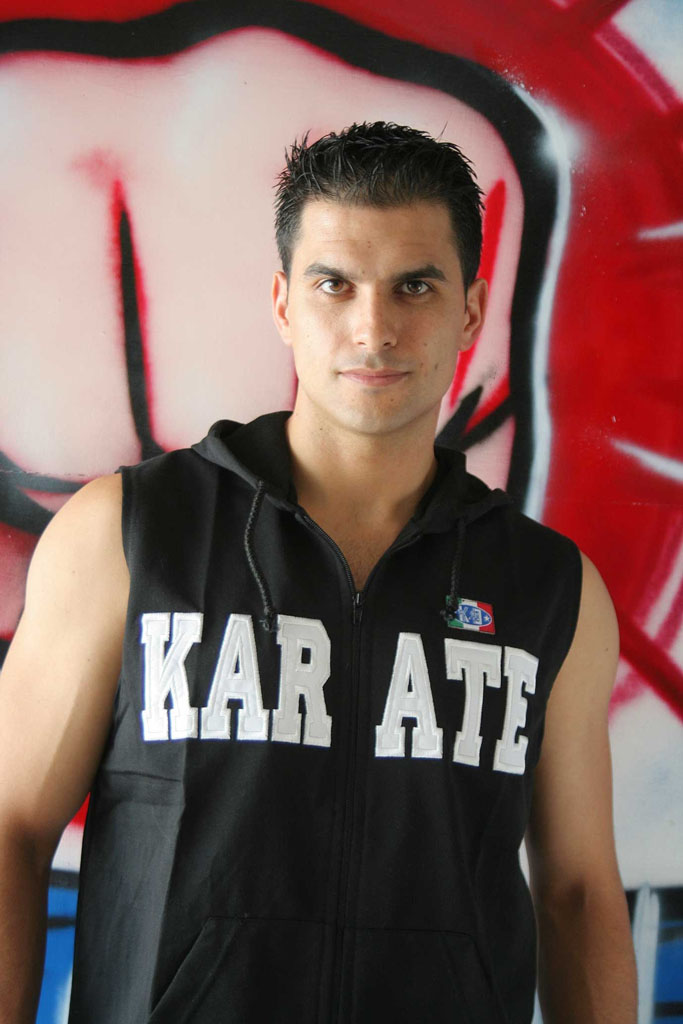 As a 5th dan black belt in Shotokan Karate, the direct student of his father, sensei Luca Valdesi has been called something of a modern day master of kata performance.
As a 5th dan black belt in Shotokan Karate, the direct student of his father, sensei Luca Valdesi has been called something of a modern day master of kata performance.
That’s right. “Performance”.
Because, as with every successful athlete, there’s always a sad bunch of critics lurking, keyboard bashing every move Valdesi does, claiming he’s nothing but a mere performer or showman. A quick look at the comment section of any of Luca’s Youtube kata performances (my channel being a prime example) will give you a hint at what I’m talking about. To me, that’s not in the spirit of Karate.
But, then again, the loudest critics are surprisingly often the exact same people who “coincidentally” enough know that Luca loves shellfish and ice cream, enjoys diving in his spare time, and weighs in at exactly 176.4 pounds.
In other words – the amazing success sensei Valdesi has had in his competitive Karate career is pretty much as controversial as it is undeniable.
But HOW does he do it?
What is his *secret*?
Although he does have an impressive team of trainers behind him (including the Head Coach of the Fiamme Gialle Karate Team, Mr. Claudio Culasso, along with the Head Coach of the FIJLKAM National Team, Professor Pierluigi Aschieri), he also has the uniquely advantageous longtime support of his family – including his wife and kids, his father/sensei Andrea (who is constantly looking after him both during the training sessions and the various competitions) and his mother (who is his most fervent supporter)!
Surely, that must be a crucial piece of the puzzle!
But let’s not speculate anymore.
After all, what better way to gain insight into the mind of a world-class Karate athlete than asking him directly?
You know that’s how I roll.
So, without further ado, straight from the scorching hot streets of Palermo, last week in Sicily, this is the result of my super exclusive interview with Luca Valdesi – the undisputed king of tournament kata. Unfortunately, time constraints didn’t allow for the depth of some of my earlier interviews with famous Karate profiles (like Antonio Diaz, Lucio Maurino or Patrick McCarthy), but I hope you’ll find some value nonetheless.
(Also, there’s a reason this guy rarely gives interviews, you know…)
So, ladies and gents, are you ready for my 2300+ word mammoth interview with world kata champion Luca Valdesi?
That’s what I thought!
Enough with the cliffhangers then.
Let’s go:
J (Jesse): First of all, a big thanks for taking some time from your incredibly busy schedule to make this interview happen. Let’s start from the beginning: When and why did you start Karate?
LV (Luca Valdesi): “I started Karate in 1982, because my father and my uncle did Karate.”
J: So, you were only six years old! And at what age did you actually start competing?
LV: “That would be when I was fourteen or fifteen.”
J: And in what way, if any, did your training change when you started competing more seriously?
LV: “Well, I mainly introduced the basic element of physical preparation. Not with any weights, but only with my body; push-ups, pull-ups… and of course a lot of running, in all the speeds! But I still continued to do Karate, a lot.”
J: And what does a regular training day look like today?
LV: “It changes. But right now, my focus is on the next competition. I train with my father and normally I work on my kata. But it’s not always like this. Depending of how I feel, my sensei will always change my training. When you always work above your limits it’s normal have some very hard days… But usually I do Karate two times a day, each session lasting around 1,5 hours.”
J: Cool. So, looking at the bigger picture, how do you think Sport Karate has changed since you started competing (22 years ago!)?
LV: “First of all: I think that Karate is Karate. To me, there no difference between “traditional” and “sport”.
J: That goes against what many other people believe.
LV: “Well, I do the same Karate that I did 30 years ago, when there weren’t even any competitions existing in Sicily! During my career, I have seen a lot of “traditionalist” Karate-ka – and honestly I think that a lot of them perform Karate under their limits. They keep practising the various movements and position very slowly, because they never really try to push further. Sure, they arrive very strongly to the impact, but often too late… My idea of Karate is to always imagine the fighting.”
J: Explain.
LV: “If I have an opponent in front of me, I have to always be faster than him. Because, if I want to produce a big power, I have to remember that power is strength for speed, so I really need to push. If I want to follow the “traditional” idea of Karate, I have to remember that all the movements – steps or punches – always start from my legs and hips, and if my feet are not correctly placed on the floor I can’t use them. A lot of Karate-ka start the movements from the shoulder, like if they want to push the opponent… and so it’s impossible to do kime.”
J: Interesting, and of course I can’t do anything but agree. If you don’t mind, however: What is your definition of “kime”, since we’re on the subject?
LV: “Kime is a short and fast contraction, and then relaxation of all the muscles.”
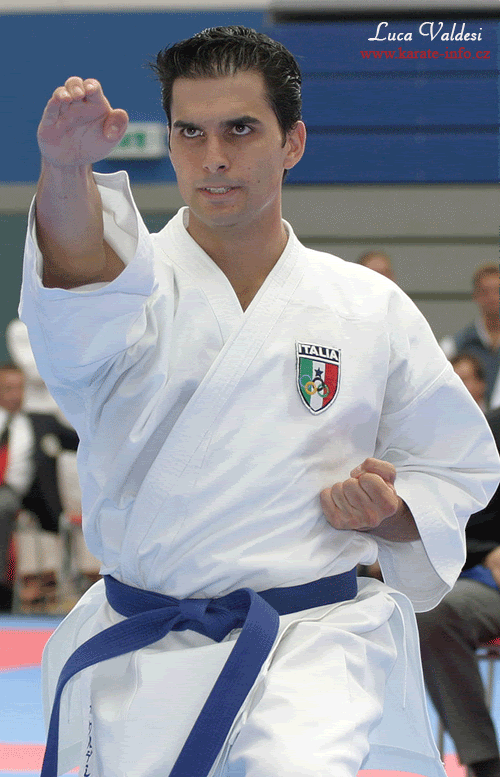 J: Great – that’s what I’ve been trying to tell people! Now, going back to your own performance – though I don’t like to talk too much about negative topics like this – many people seem to criticize your techniques, saying you are not doing “traditional” Shotokan kata. What is your message to them?
J: Great – that’s what I’ve been trying to tell people! Now, going back to your own performance – though I don’t like to talk too much about negative topics like this – many people seem to criticize your techniques, saying you are not doing “traditional” Shotokan kata. What is your message to them?
LV: “In practise, I changed my Karate when I started to study my own idea of Karate, when I realized I need to try to go over my limits… when I was able to actually SEE my opponent in front of me! So, I think that the “traditional” Karate-ka maybe don’t accept my powerful pushing in the beginning of the movements. I don’t know why. Sure, afterwards it is normal that when your speed is very big it’s easy to lose your position, or lose your balance a little. But in my idea it’s better to arrive in good, perhaps not perfect, position than losing your life against your opponent…”
J: That actually sounds a lot like the ikken hissatsu theory, popular in most Japanese traditional martial arts – “one punch kill”. Now, since you already touched on the subject earlier, what is your brief take on this whole “Sport” vs. “Tradition” issue that many people seem so concerned about in today’s Karate world?
LV: “Like I told you: To me, there is no difference! Karate is Karate – and the training must always be complete: kata, kihon, kumite, self defence, philosophy… And if we talk about kumite, especially, I think the modern “sportsman” Karate-ka are often more dangerous than the average “traditional“ Karate-ka. I think that a punch from Maniscalco [Stefano Maniscalco, several times Italian, World and European kumite champion] can kill a man just like a punch from the best traditional Karate-ka can, maybe even better…”
J: Indeed. The amount of physical, technical and mental preparation the best modern Karate athletes go through is often underrated. But how do you feel about the Average Joe, then? Is competition something everybody really needs? I mean, from the beginning, there didn’t even exist tournaments in Karate!
LV: “To compete is not important…”
J: WHAT?!
LV: “It’s just a way that can help you understand something more about yourself. When your body is pushed everyday, again and again, over the limits, your ability is improving and your character becomes stronger. In my idea, this is one of the best things about the Japanese: Their incredible work ethic. They always know you have to work. And I worked with a lot of big sensei – the school of Shirai, the school of Takashi and also the school of Kanazawa. The competition is only a competition. The most important thing, for me, for the competition, is the sacrifice – for the body and for the soul.”
J: That’s how I feel too. But, even though competition is evidently not the biggest thing in the world for you, if you had to choose just one moment from your whole career that you consider your favorite, which one would it be? Which experience stands out?
LV: “In this moment of my live I spend a lot of time to prepare the competitions, a lot more training than before, so I don’t have as many recent memorable moments outside of the dojo walls. Probably, my best moment has to be when I won my second individual world championships.”
J: Why?
LV: “Well, I think that everybody can win one time… but only a few champions can win a second time… and then a third time, in Japan. To me, that has no price – like the Master Card advertising [laughs]!
J: Haha, priceless! And if you don’t mind me asking: How long do you think you’ll keep this high level of competition up? I mean, you’ve been doing it for so long already!
LV: “The competition is the fun and playful part of Karate for me, after a lot of hard work and sacrifice in the dojo. So when it will be not funny for me anymore, I’ll stop.”
J: Earlier you mentioned training with some famous Japanese schools of (Shotokan) Karate. Tell me how your various teachers have influenced you over the years.
LV: “Yes. Well, the most important thing for me was always to try to understand their idea of Karate, not to copy them. So, in this way, my Karate it’s a perfect mix for myself. All this was possible because I have the best sensei possible, my own father, who with big humility and intelligence studied with me – for me – trying to find our way. He pushed me to try different work with a lot of different sensei, or other instructors in my region, to improve both my motivation and my knowledge.”
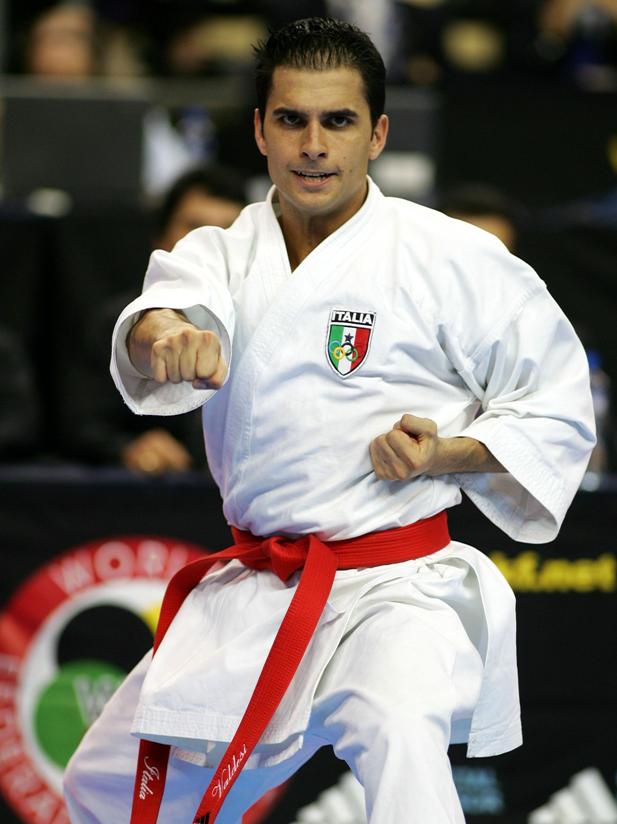 J: In other words; continual exposure to a plethora of constructive ideas and methods produces a productive mind that is always open and eager to improve – eventually resulting in inevitable success. That’s what some people would call a Karate Nerd™…
J: In other words; continual exposure to a plethora of constructive ideas and methods produces a productive mind that is always open and eager to improve – eventually resulting in inevitable success. That’s what some people would call a Karate Nerd™…
LV: “I know a lot of “traditional” sensei that think they always do the best, so they feel they don’t need to openly share their knowledge… and their students can’t even have different experiences of training. Booh! But, for example, my sensei is a police instructor of self-defense. I think his Karate it’s not only a “form”…
J: Speaking of your teacher: I remember reading a quote by Confucius [ancient China’s most famous teacher, philosopher and political theorist, 551-479 BC], saying that one should “never teach his own children”. With that being said, how has the relationship between you and your sensei (father) worked out?
LV: “From what I’ve told you, I think you understand the relationship with my sensei. My father is my sensei both in the dojo and in my life. I’m lucky.”
J: That’s wonderful. Now, it seems we have to wrap this interview up in a minute, but before we quit I need to ask the one hot question everybody desperately wants to know: What is the secret of becoming #1 in the world, like you?
LV: “First: Understand that you have to be fast – to survive or to protect you family. Second: WORK! And remember; in Karate the brain work is 90% of the work…”
J: Love it. Could you explain that last part? Is this connected to mental training?
LV: “If the brain understand my needs, it can help me move my body with the best physical solution possible… And yes, I did in the past some few mental training exercises, only for the competition. But I understand now that the best work for both the body and brain is the WORK! It’s the same when you do an examination at the university; if you study it’s never too difficult, is it? No, it depends only on your preparation.”
J: So you have no real mental training tools, or methods, to share with my readers?
LV: “No. Imagine your opponent and fight against him.”
J: So, since we have already talked about the past and the present, let’s end this interview with the future: How do you think Sport Karate could improve?
LV: “Karate is Karate. Everything can improve with the right research. Nobody can say in which direction.”
J: Right… and what about the possibility of Karate being in the Olympics?
LV: “Too many people spend a lot of time talking about this….”
J: Okay… so what about your own future plans then?
LV: “I would like to share my knowledge with the guys ready to understand me.”
The End.
_______________
And with those last words our interview abruptly ended, as Father Time had other things planned for our lives that day.
A thousand thanks, “grazie mille”, to Valdesi sensei for making this happen.
Now, did you enjoy it?
Did you gain some insight from peeking into the mind of a legendary world-class Karate athlete?
Needless to say, even though modern Karate, kata, or sports in general might be the least of your interests; I hope you still got some good ol’ inspiration and kick-in-the-ass motivation for your own journey in Karate from this interview. I mean, hey, there’s a reason world champions are not like the rest of us…
Eastern wisdom…
Western vision.
That’s the way it has to go. You just gotta figure it out… then get to work. At the end of the day, it’s all about the sacrifice – for the body and the soul.
As one of my all-time favorite quotes go:
“The higher we soar, the smaller we appear to those who cannot fly.”
– Friedrich Nietzsche
Valdesi knows.
Ciao.
PS. Want more Valdesi? Hear his take on the relationship between kata and fight!
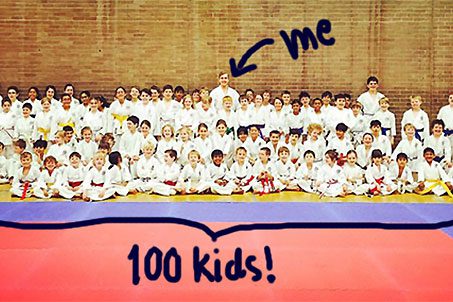
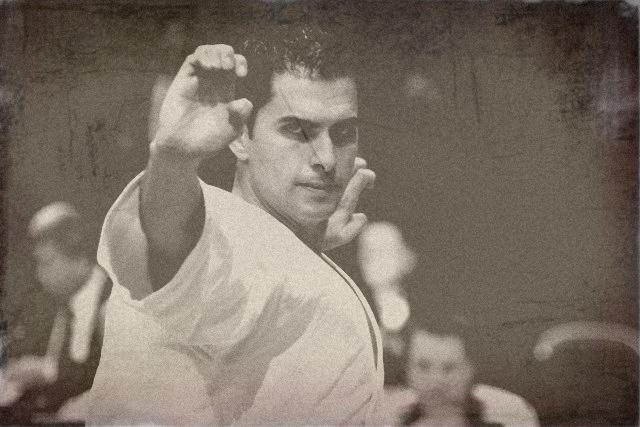
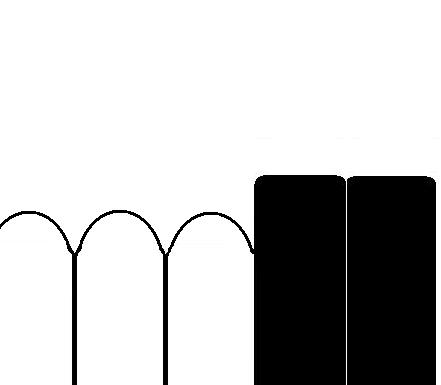
16 Comments